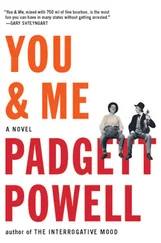He sighed, and then he jerked the scope a half inch to the right and froze it. Looking back on it, this is where I place his biggest gamble, his shrewdest moment. "Tell me, what should I see?"
"Clippers!" I exhaled. “Wooden laminate masted rolling regular clippers!"
He grunted and shuffled his feet.
"The canvases are coarse," I say. "Shredded and hemp-flogged, wet, salt-stained, grand pieces of cotton representing the lost fields who bore them!"
"Yes," the stranger said.
"Muslin!" I nearly shout. Who was testing who? "Great flying manila, popping in the breath of Neptune. And the wood. Varnished hard and sleek, teak and oak. The grains are a study."
"A what?"
"Check the hulls!" He just looked on, patient as ever.
"Well?" I had him.
He blurted, "The hulls. Yes." He got away with something again! This really set me up. I turned the vertical-hold knob.
"And the paints, marine paints, coat on coat, voyage on voyage, haul, haul, dry haul diurnal and long. The colors are myriad and embattled, layered soldiers on the land it is their end to protect: blues, yellows, marine greens, and reds barnacled all over each other in their hopeless flaking mission. They’ve had it, bleached christenings of some jack-leg lubber in. . I was spent. Where had my boats been painted?
"Savannah," he said, still looking.
We looked over the water where the pattern of infinite shatterings forming the bright, glassy triangle from the moon was unbroken by boat or bird.
"I’m Simons," I said. We shook hands.
"When it’s school time you’d better come get me," he said.
"All right. You want to tell me about this Theenie thing?"
We went in the shack and he poured himself another jelly glass of liquor and my own little wheeze of it and told me what happened. And a few other things I wanted to know, and more in the morning and afternoon, and we began our association thenceforth.
A Summons at Edisto
The process server told me he took the coastal highway south and the small road off to the left at a sign marked Edisto Beach. For twenty miles he drove in the dark to the steady sound of his automobile. Then he began to hit the marsh pockets.
He could not see the beginning marshes but could hear them. The cruising fullness of sound made by his car noises bouncing back from the close oaks and country houses would suddenly stop; a hollow, retreating, new quiet air. He looked out and saw nothing and then house and brush and trees blasted back close and full of sound. It was like running through an old wooden house, rooms opening off a narrow hall, hollows of sound breaking the noise of your running.
It was too late to serve a paper. He stopped and stayed in a motel that sat in a halo of its own pink-and-green neon lights. In the small wooden room, he went to sleep listening to the hypnotizing hum of cars down the road.
In the morning all he had to go on was an account of a set of roads near the beach beyond the paved road. There were miles of them, and on one of them, near the beach, was what was described to him as a rich man’s house. Near it was a small shack. There his trail ended. He had a summons for a woman someone said had something to do with that shack.
Coming around a curve in the road where oak trees were painted white, he had to stop because of people in the road. He parked his car and got out and walked toward a tree they were surrounding."Law," one of them said. Looking through them, he saw at the foot of the tree a boy, as if asleep, suddenly open his eyes and jump up. as if awakened. Then the boy sat down.
He shouldered back through the crowd past a school bus and continued. The air was salty as he reached the end of the hard road and began nosing down a graded road through heavy palmetto. The palmetto grew fuller, became a virtual tunnel of scabbling palms. He passed a wooden sign, SAVANNAH CABANA, and then saw the rich man's house. He got out and climbed its stairs and knocked and looked in. In the main room were wicker sofas and chairs, a bamboo bar, a ceiling fan, metal tumblers, and glass decanters. The long curtains suspended over the floor-to-ceiling windows kept billowing out with the breezes, dusting the hardwood floors. The place was lit by the ocean’s bright upward glare. He went down the stairs and saw, beside a rusted-out Carrier compressor, a heap of carpets housing sea roaches and sand crabs.
He pulled up to the other, smaller house up the beach. The door opened and an old Negro woman said, "Sim, your momma was’n spose—” and stopped, eyes lowering. "What you wont?"
"I’m looking for Louester Samuels.”
She looked at him in wonder. She managed to say, "What you wont wid her?"
"It’s a legal paper for her."
"I know what you wont," she then said, and fell back into the small house and grabbed a shawl and a stack of linen and nearly knocked the process server down with her charge out the door. Then she turned and circled him and went back in and pulled a bundt pan from the oven bare-handed and charged him again. Then she stopped and dropped the cake on a table and made a final charge past him and down and out and trundled to the first tunnel of palms husking in the wind and stopped and turned and she fixed him with an incredulous look. Then was gone into the queer, muffling, constantly moving trees. The process server stood on the porch under an overhang of tin roof, its wood hot and dry from the long afternoon sun, the tin going tic, tic.
He went inside and smelled the hot cake and looked the room over. What took his attention was the walls, covered with yellowed newspapers. He read them, kneeling on the bed to get closer — stories about the Work Projects Administration. He felt the bed, soft in its heavy blanketing, and lay down and crossed his feet and put his hands back under his head and took a nap.
He woke a little after dark and left the house for the husking tunnel of palms and palmettos the Negress had taken. At its end was the other house, the Savanah Cabana. He climbed the stairs again and stood on the porch beside a wringer washing machine until a woman came to the door.
That’s the bare bones of how he scared Theenie out of the county. What took me some time to figure out was why. She thought he was her grandson. That’s what the Doctor said, anyway. It sounds crazy, because he looks as white as a regular coroner to me. But you know how that works.
I remembered then that Theenie used to complain about her daughter being in trouble. In Theenie’s book you can be dead broke, sick, jobless, no place to stay, and still be doing all right provided the law is not after you. She calls it the gubmen. The gubmen is like God: all-powerful and merciless. The hardest thing in the world for her to do is call the social security office about a late check. If she had one stolen from her mailbox, I’m not sure she’d call anybody. “Life hard, Sim" is about what she’d say. And hire someone to watch for the postman next time.
And the Doctor said she thought this process server was her grandson by her daughter who went to New York, which is Gomorrah to people here. Well, one look at him and you knew he was not all black, and that meant white people were involved, and one look at his blue summons and she knew the gubmen was involved, so it’s major.
A Question of Heredity
It didn’t take a genius to know it was big, not after I knew Theenie had been at the house and thrown down the laundry and wasn’t back at her shack and had left my cake out there without her wax paper sealed to it like peritoneum — you know, she has a thing about freshness. She can sit down with some chicken she found in tin foil about two weeks old and heat it up by letting it sit on the table while she irons and then eat it with a Co’-Cola, bouncing the bones in her hand to check for meat she hadn’t sucked off, and be perfectly happy. And she could cook mullet brought in head down in a pickle bucket of pink fish slime and worm goo, fry them, and bounce those bones a little too, but when it comes to making something like a cake, which, considering its components (like water and flour and other powders), can’t be too foul, at least not like mullet in a bucket sat on by a fat lady in the sun until they stopped biting — it comes to making a bakery-clean white thing like a cake and she’s got to have fresh eggs, fresh real butter, sweet milk, and you can’t even walk around the house while it cooks lest it fall, and she won’t run the vacuum cleaner while it’s in there either. She can only sit down with another Co’-Cola and a Stanback powder to virtually pray for it, and then it’s out, it will have to cool, and nine times out of ten, before you can touch it, she has grafted to it wax paper set into the hot buttery sugary crust of the cake and welded there by a fusion of wax and cake, and that cake you could throw in the ocean and it would float like a crab-pot marker for years, and the day it washed up on a beach and was found by an islander he could take it to his hut and with great-eyed delight peel off the wax paper with his skinning knife and devour the rich, golden flesh inside. And as soon as you slice up this memorial, this baby, and make your smacky fuss about how good it is, she starts making her fuss about how much trouble it is, and she’s not making any more, she’s too old, you’re too old, too old for her to have to work that hard, why, she raised you. (She raised two other sets of white kids before me. And she’s not through until she hears they got married.) You smile and smack and smile away, she sitting at the kitchen table in her white uniform, hair bluing and legs swollen, fingering an aspirin onto a toothache, complaining and complaining before rising and completing without another idle breath the rest of the cleaning or ironing or bedmaking or whatever kind of tracking after the mess of white folks that afternoon presents, and she shows up the next morning with a silent assault on the breakfast detail, fresh and renewed somehow against a thousand cigarette butts in amber dregs of whiskey, and strewn clothes, and crap, crap from the high life.
Читать дальше












